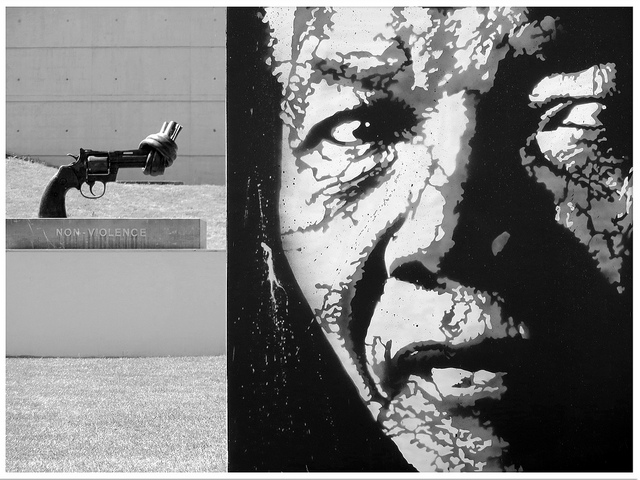You can change the conversation. Chip in to rabble’s donation drive today!
In his tribute to Nelson Mandela, the South African Noble Prize winning novelist J.M. Coetzee says the South African government Mandela headed after spending “twenty-seven of the best years of his manhood incarcerated at the pleasure of the state” lacked a philosophy of resistance.
Like others in the leadership of the African National Congress (ANC), Coetzee argues, Mandela “was blindsided by the collapse of socialism worldwide.” The “urgent business” of creating “a just economic order” was unable to cope with “a new, predatory economic rationalism.”
Presenting the dilemma faced by Mandela and the ANC as part of the worldwide failure of Western social democracy or Eastern European communism to provide a philosophy of resistance to neoliberalism, provides a context for the economic challenges the ANC encountered when it took power in 1994. The fall of the Berlin Wall had emboldened capitalist wolves in neoliberal clothes, its “rationalism” driven by fear and greed. But South Africa has its own resources and its own means of resistance.
Any aid the former Soviet Union provided to South African nationalists or Communists could not mask the authoritarian and destructive nature of the Soviet Union and of its allied Communist party regimes. The demise of both was no defeat for socialism which had long since ceased to animate the politics of the Eastern Bloc.
The strength of capitalist ideology is the grip it exercises over people worldwide hoping to improve their material circumstances through paid work. The popular appeal of a good job leading to a better life convinced social democratic governments to accommodate capitalists, and expect less and less in return.
Western social democracy offered little to either emerging Third World democracies or traditional supporters at home to counter the obvious failings of the dominant ideology.
Despite the ANC adoption of conventional economic policies, debates within South Africa after the liberation of Mandela turned around critiques of capitalism. Even as the country found itself subject to world market forces, socialism showed itself integral to the political culture of South Africa, whatever direction the ANC government chose to take.
The first draft, written in prison by Mandela, of Long Walk to Freedom has recently been made available by the Nelson Mandela Centre for Memory. For students of national liberation movements, it provides a fresh assessment of the nature of the resistance that led to the overthrow of the apartheid regime and still animates South African social movements.
Mandela describes how the movement started by Ghandi on behalf of South African Asians influenced him and others in the ANC Youth where Mandela made his first entry into politics. Mandela remembers the year 1949 as when the ANC decided to adopt “the boycott, strike, stay-at-home, passive resistance, protest demonstrations and other forms of mass action as its principal weapon” (p. 96). The resistance tactics initially deployed by the ANC in its Defiance Campaign became part of the U.S. civil rights movement as Martin Luther King Jr. made non-violent resistance his creed.
Mandela describes himself as a nationalist. Educated at “Wits” (Witwatersrand), an English university (three of them allowed black students entry) he studied liberal thinkers such as Harold Laski (professor to Pierre Trudeau and many other future leaders), George Bernard Shaw and Bertrand Russell, but found little to inspire him about how to build a new society in Africa.
Introduced to what he called Marxist-Leninism by other black intellectuals, Mandela overcame his initial skepticism and drew strength from what he read in making his own analysis of the steps needed to liberate South Africa.
Mandela, like other African national leaders, expected his country could take the best of what the West and the East had to offer, but that ultimately it would have to find its own way.
Mandela never doubted that the enemy of his country was racism. South Africa had made racial discrimination the basis of political organization. It was the colour bar that needed to be overcome through united action. Mandela writes about how not enough thought was given to what kind of society was needed to overcome racism and build a new South Africa.
After 1961, Mandela describes how, unlike Ghandi or King, he advocated armed resistance. All three suffered from violence, but all three are best remembered for their non-violent resistance. From prison Mandela prevailed over the armed might of his oppressors. Martin Luther King Jr., now celebrated with a January 21 U.S. national holiday for his civil rights campaigns, was also by 1967 the leading American voice against the unjust war his country waged against the Vietnamese. Like King, an assassin killed Ghandi before his work was done.
It would be a mistake to dismiss non-violent resistance to neoliberalism and believe that a socialist model to replace capitalism is what is needed first. State-sponsored social democratic or communist regimes bargain and negotiate with capitalists, and offer little by way of an alternative to citizens. The non-violent tactics first employed by Ghandi in South Africa have much to offer those who believe another world is possible, and has now become necessary.
As in South Africa, new forms of action produce a philosophy of resistance. It needs to be recalled that patience and endurance are part of what made non-violence effective.
Duncan Cameron is the president of rabble.ca and writes a weekly column on politics and current affairs.
Like this article? Chip in to keep stories like these coming!
Image: abac077/flickr



